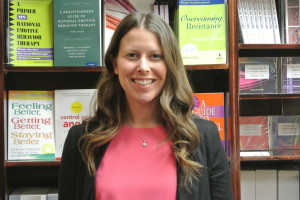by Stephanie Schwartz, M.S.
Sleep is essential for our health. According to the American Academy of Sleep Medicine and Sleep Research Society, “adults should sleep 7 or more hours per night on a regular basis to promote optimal health” (Watson et al., 2015)*. And yet, many people don’t get the recommended amount of sleep regularly. I’ve noticed that for me 7 hours actually is not adequate for me to function at my best the following day. While I typically strive to get a sufficient amount of sleep, things happen. When I’m up later than usual or need to wake up earlier than I typically do, I may not get as much sleep as I know is best for my health. When this happens, as I’m lying in bed I find myself calculating in my head the maximum number of hours of sleep I could get that night. If the number is less than what is ideal for me I tend to continue to think about it and the possible consequences. A belief I have in these moments is, “If I don’t get enough sleep I will be tired tomorrow. That will make it harder to get through the day and I won’t be able to tolerate it.” Following the theory of REBT, I would typically dispute my ability to “tolerate” feeling tired the next day. Have I been able to tolerate it before? Yes. Would I be able to survive feeling tired and get through the day? Yes. So, while it would be difficult and I’d prefer to not feel tired, I would be able to tolerate getting through the day. While this dispute is valid and useful, I actually find functionally disputing my belief to be more helpful for me in the moment. What I typically ask myself is, “how is thinking that I can’t tolerate not getting enough sleep helping/hurting me to achieve my goal of falling asleep quickly and getting the most sleep I can?” When I remind myself that: (a) continuing to think about the situation will not change it and (b) doing so in fact blocks me from being able to fall asleep – I realize that my beliefs are actually making a bad situation worse. Recognizing this motivates me to stop thinking about my sleep and instead shift my focus to something else.
*Watson NF, Badr MS, Belenky G, Bliwise DL, Buxton OM, Buysse D, Dinges DF, Gangwisch J, Grandner MA, Kushida C, Malhotra RK, Martin JL, Patel SR, Quan SF, Tasali E. Recommended amount of sleep for a healthy adult: a joint consensus statement of the American Academy of Sleep Medicine and Sleep Research Society. SLEEP 2015;38(6):843–844.

